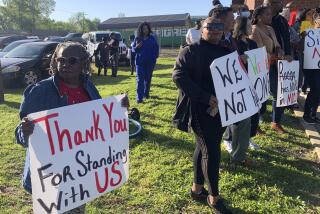1992 Tape Reveals Merrill Lynch’s Warning to Citron on Investments
- Share via
SANTA ANA — More than two years before Orange County’s investment pool collapsed, worried Merrill Lynch & Co. officials warned then Treasurer Robert L. Citron that the county’s investment holdings were too concentrated in high-risk securities and formed a “SWAT team” to avert disaster, according to a taped conversation made public Thursday.
Concern was so great at Merrill Lynch & Co. that the bond salesman handling the county’s account was abruptly summoned from London back to New York--while en route to a vacation in Africa--in order to explain the county’s investment portfolio to alarmed superiors in New York, according to the taped telephone conversation between Citron and the salesman, Michael G. Stamenson.
“We’re trying to look out for our best interest, your best interest, so that, you know, we don’t get into trouble here,” a harried-sounding Stamenson said during the Nov. 9, 1992, conversation.
“It is the belief of everybody but me, to be honest about it Bob . . . that you are too concentrated in the [highly volatile securities],” Stamenson said. “You’ve got too many eggs in one basket.”
During the 40-minute conversation, unsealed Thursday by an Orange County judge, Stamenson told Citron that Merrill Lynch had considered asking the treasurer to obtain a letter from county supervisors endorsing Citron’s risky strategy, but dropped the idea because they were sure he would refuse.
Stamenson said officials at the Wall Street giant were especially edgy about an article that had recently focused attention on Merrill Lynch’s selling of high-risk securities, known as derivatives, to municipalities.
“It went through Merrill Lynch like an ICBM missile,” Stamenson said of the article. Stamenson said his superiors approached Citron’s potential problems from “a gigantic save-your-ass point of view.”
But at the same time Stamenson conceded “there was probably a lot of truth” in his bosses’ concerns. “They want to see you kind of turn the ship a little bit” to reduce the county’s risk, the salesman said.
Citron, sounding by turns befuddled and combative, accused Merrill Lynch officials of waiting until it was too late to warn him of the perils of the high-risk securities.
Citron said that a representative from a rival brokerage, J.P. Morgan, had warned him seven months earlier that his holdings were too volatile. But Citron recalled that Stamenson and other Merrill Lynch officials dismissed the rival firm’s warnings.
Reacting harshly to the Merrill Lynch salesman’s comments about the risky nature of his investment portfolio, Citron told Stamenson that “during [the] year and a half [after] starting to buy these things in July of ‘91, you or nobody at Merrill Lynch ever came to me and said, ‘You know, you shouldn’t be buying so many of these things.’ . . . Merrill Lynch has some culpability in this situation.”
But Stamenson said the new warnings he brought were being offered in a spirit of friendship with one of the firm’s best clients.
The tape, recorded by Citron, provided new ammunition to both sides, who have blamed each other since the bankruptcy.
Citron’s lawyer, David W. Wiechert, said the conversation provided “incontrovertible evidence that Merrill Lynch was guiding and fashioning Orange County’s investment strategy.” He said it was clear from the tape that Citron’s troubles stemmed from following Merrill’s advice precisely.
Merrill Lynch officials denied that they had been seized by panic, saying the review of Citron’s investments was “methodical.”
More to Read
Inside the business of entertainment
The Wide Shot brings you news, analysis and insights on everything from streaming wars to production — and what it all means for the future.
You may occasionally receive promotional content from the Los Angeles Times.










